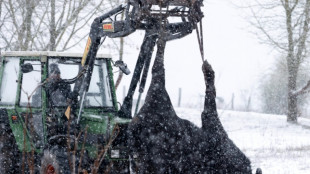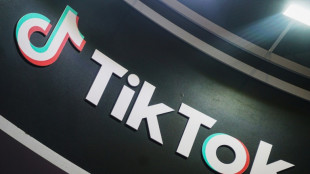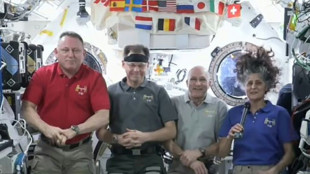
-
 Germany reports foot-and-mouth disease in water buffalo
Germany reports foot-and-mouth disease in water buffalo
-
US hikes reward for Maduro arrest after 'illegitimate' swearing-in

-
 Robots set to move beyond factory as AI advances
Robots set to move beyond factory as AI advances
-
Pro-Russian disinformation makes its Bluesky debut

-
 UK gas reserves 'concerningly low', warns biggest supplier
UK gas reserves 'concerningly low', warns biggest supplier
-
2024 warmest year on record for mainland US: agency

-
 Meta policy reversal puts question mark on future of fact-checking
Meta policy reversal puts question mark on future of fact-checking
-
Meta policy reversal puts question mark on furure of fact-checking

-
 Strong US jobs report sends stocks sliding, dollar rising
Strong US jobs report sends stocks sliding, dollar rising
-
US hiring beats expectations in December to cap solid year

-
 UK gas reserves 'concerningly low': Biggest supplier
UK gas reserves 'concerningly low': Biggest supplier
-
Global stocks mostly fall before US jobs data

-
 Ubisoft: the 'Assassin's Creed' maker targeted by suitors
Ubisoft: the 'Assassin's Creed' maker targeted by suitors
-
Stock markets drift lower as US jobs data looms

-
 Pakistan flight departs for Paris after EU ban lifted
Pakistan flight departs for Paris after EU ban lifted
-
Nobel laureate Malala Yousafzai to visit native Pakistan for girls' summit

-
 AI comes down from the cloud as chips get smarter
AI comes down from the cloud as chips get smarter
-
Tajikistan bets on giant dam to solve electricity crisis

-
 Uruguay bucks 2024 global warming trend
Uruguay bucks 2024 global warming trend
-
Last 2 years crossed 1.5C global warming limit: EU monitor

-
 Japan 'poop master' gives back to nature
Japan 'poop master' gives back to nature
-
US Supreme Court to hear TikTok ban case

-
 US Fed's December rate cut should be its last for now: official
US Fed's December rate cut should be its last for now: official
-
Paris Hilton among celebrities to lose homes in LA fires

-
 Airbus boosts plane deliveries in 2024
Airbus boosts plane deliveries in 2024
-
Ubisoft reviews restructuring options, postpones new Assassin's Creed

-
 Lamborghini sets new sales record amidst hybrid push
Lamborghini sets new sales record amidst hybrid push
-
Lebanon army chief Aoun becomes president after two-year vacancy

-
 US emissions stagnated in 2024, challenging climate goals: study
US emissions stagnated in 2024, challenging climate goals: study
-
Lebanon army chief short of required majority in first round of president vote

-
 Global stock markets mixed tracking US rates outlook
Global stock markets mixed tracking US rates outlook
-
Lebanon meets to finally elect president after two-year vacancy

-
 Celebrities flee Los Angeles fires, lose houses as Hollywood events scrapped
Celebrities flee Los Angeles fires, lose houses as Hollywood events scrapped
-
Japan startup hopeful ahead of second moon launch

-
 Ukraine allies to hold last defence meet before Trump takes office
Ukraine allies to hold last defence meet before Trump takes office
-
Myanmar military adopts anti-junta fighters' drone tactics

-
 CES tech looks to help world's aging population
CES tech looks to help world's aging population
-
Rubber tappers forge sustainable future in Amazon

-
 US astronauts upbeat seven months into eight-day mission
US astronauts upbeat seven months into eight-day mission
-
Extreme weather, suburban sprawl fuel LA's wildfires

-
 Political chess or true beliefs? Zuckerberg's surprise Trump pivot
Political chess or true beliefs? Zuckerberg's surprise Trump pivot
-
US Fed officials concerned over 'stalled' disinflation, tariffs: minutes

-
 Celebrities flee Los Angeles fires as Hollywood events scrapped
Celebrities flee Los Angeles fires as Hollywood events scrapped
-
Several US Fed officials concerned over 'stalled' disinflation: minutes

-
 US tech titans ramp up pressure on EU
US tech titans ramp up pressure on EU
-
'Wicked' tops SAG Awards nominations

-
 Safe from looting, Damascus museum reopens a month after Assad's fall
Safe from looting, Damascus museum reopens a month after Assad's fall
-
Award-winning migrant actor earns visa to stay in France -- as a mechanic

-
 Celebrities forced to flee Los Angeles blazes
Celebrities forced to flee Los Angeles blazes
-
US tariff and inflation fears rattle global markets

| NGG | -2.98% | 56.301 | $ | |
| RBGPF | -4.54% | 59.31 | $ | |
| BCC | -2.76% | 114.247 | $ | |
| RYCEF | 0.28% | 7.22 | $ | |
| CMSD | -0.04% | 23.39 | $ | |
| SCS | -3.01% | 10.97 | $ | |
| CMSC | -0.09% | 23.08 | $ | |
| BCE | -2.34% | 23.09 | $ | |
| VOD | -1.42% | 8.095 | $ | |
| JRI | -1.03% | 12.095 | $ | |
| RIO | 0.74% | 59.065 | $ | |
| RELX | -0.78% | 46.41 | $ | |
| GSK | -1.64% | 33.205 | $ | |
| BP | 0.78% | 31.366 | $ | |
| AZN | 1.04% | 67.28 | $ | |
| BTI | -1.76% | 36.105 | $ |

Scientists seek miracle pill to stop methane cow burps
A scientist guides a long tube into the mouth and down to the stomach of Thing 1, a two-month-old calf that is part of a research project aiming to prevent cows from burping methane, a potent greenhouse gas.
Paulo de Meo Filho, a postdoctoral researcher at University of California, Davis, is part of an ambitious experiment aiming to develop a pill to transform cow gut bacteria so it emits less or no methane.
While the fossil fuel industry and some natural sources emit methane, cattle farming has become a major climate concern due to the sheer volume of the cows' emissions.
"Almost half of the increase in (global) temperature that we've had so far, it's been because of methane," said Ermias Kebreab, an animal science professor at UC Davis.
Methane, the second largest contributor to climate change after carbon dioxide, breaks down faster than CO2 but is more potent.
"Methane lives in the atmosphere for about 12 years" unlike carbon dioxide which persists for centuries, Kebreab said.
"If you start reducing methane now, we can actually see the effect on the temperature very quickly."
Filho uses the tube to extract liquid from Thing 1's rumen -- the first stomach compartment containing partially digested food.
Using the rumen liquid samples, the scientists are studying the microbes that convert hydrogen into methane, which is not digested by the cow but instead burped out.
A single cow will burp roughly 220 pounds (100 kilograms) of the gas annually.
- 'Social critters' -
Thing 1 and other calves receive a seaweed-supplemented diet to reduce methane production.
Scientists hope to achieve similar results by introducing genetically modified microbes that soak up hydrogen, starving methane-producing bacteria at the source.
However, the team proceeds cautiously.
"We can't just simply cut down methane production by removing" methane-making bacteria, as hydrogen could accumulate to the point of harming the animal, warned Matthias Hess, who runs the UC Davis lab.
"Microbes are kind of social critters. They really like to live together," he said.
"The way they interact and affect each other impacts the overall function of the ecosystem."
Hess's students test different formulas in bioreactors, vessels that reproduce microorganisms' living conditions in a stomach from movements to temperature.
- More productive cows -
The project is being carried out at UC Davis as well as UC Berkeley's Innovative Genomics Institute (IGI).
IGI scientists are trying to identify the right microbe -- the one they hope to genetically alter to supplant methane-producing microbes.
The modified microorganisms will then be tested at UC Davis in the lab and in the animals.
"Not only are we trying to reduce methane emissions, but you also increase the feed efficiency," said Kebreab.
"Hydrogen and methane, they are both energy, and so if you reduce that energy and redirect it to something else... we have a better productivity and lower emissions at the same time."
The ultimate goal is a single-dose treatment administered early in life, since most cattle graze freely and can't receive daily supplements.
The three research teams have been given $70 million and seven years to achieve a breakthrough.
Kebreab has long studied sustainable livestock practices and pushes back against calls to reduce meat consumption to save the planet.
While acknowledging this might work for healthy adults in developed nations, he pointed to countries like Indonesia, where the government is seeking to increase meat and dairy production because 20 percent of children under five suffer from stunted growth.
"We can't tell them to not eat meat," he said.
A.Samuel--CPN
